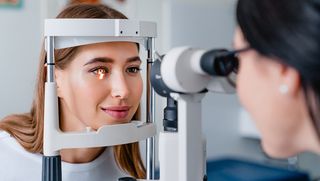Understanding the retina
How your retina works and the issues which can affect it.

Summary
The retina is a part of your eye responsible for translating light into images. Issues with the retina can be associated with conditions such as retinitis pigmentosa, retinal vascular occlusion, Stargardt disease and Usher syndrome.
The retina is the delicate layer at the back of your eye that helps translate light into images.
The retina contains two helpers called rods and cones. These are special light sensitive cells. Rods help you to see in low light or at night, and cones allow you to see colours and fine details. Together they make sure you can see clearly in different lighting conditions.
Changes in the retina
Your retina plays a crucial role in your ability to see clearly, but like all parts of the body, it can experience changes over time. Changes in the retina can happen naturally as we age, or they may occur due to hereditary predispositions or certain health risk factors.
Risk factors for retinal conditions may include:
- Aging.
- Smoking.
- Obesity.
- A family history of retinal disease.
- Damage or trauma to the eye.
- Some diseases including diabetes.
Symptoms of retinal conditions
Symptoms of retinal conditions can be variable and effect individuals differently, and over different timelines.
Symptoms may include:
- Blurriness.
- Difficulty seeing in low light.
- Dark spots in vision.
- Reduced peripheral vision.
- Light sensitivity.
Symptoms can range from mild to more noticeable, with some people experiencing only slight changes in their vision and others having more significant effects.
Equip yourself
If you have a retinal disease or care for someone who does, it’s important to understand how it works. Having the right information and support can empower you to make informed decisions about your eye health and take steps to protect your vision, and to prepare for your future.
Seek treatment
Seeking timely treatment can make a big difference. From lifestyle adjustments to medical interventions, your eye care professional will work with you to manage these changes and help you maintain your vision for as long as possible.
Treatment is available for some retinal diseases, and the goal of your eyecare professional may be to preserve, improve or restore your vision – depending on the retinal condition or disease. Prioritise your health by:
- Attending regular eye exams to help catch and monitor any changes. You can also speak to your GP.
- Maintaining a healthy lifestyle.
For more information
Always speak to your GP and eye care professional about the best treatment options for you.
Did you find this article helpful?
Share your thoughts and help us make our resources better for everyone.
Enjoying the content?
Start building your profile to access personalised support, resources, and tools tailored to your eye health journey.
